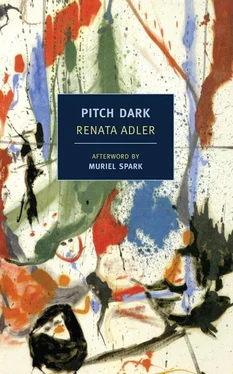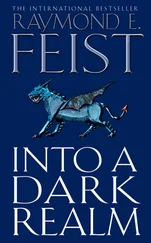Renata Adler - Pitch Dark
Здесь есть возможность читать онлайн «Renata Adler - Pitch Dark» весь текст электронной книги совершенно бесплатно (целиком полную версию без сокращений). В некоторых случаях можно слушать аудио, скачать через торрент в формате fb2 и присутствует краткое содержание. Год выпуска: 2013, Издательство: NYRB Classics, Жанр: Современная проза, на английском языке. Описание произведения, (предисловие) а так же отзывы посетителей доступны на портале библиотеки ЛибКат.
- Название:Pitch Dark
- Автор:
- Издательство:NYRB Classics
- Жанр:
- Год:2013
- ISBN:нет данных
- Рейтинг книги:3 / 5. Голосов: 1
-
Избранное:Добавить в избранное
- Отзывы:
-
Ваша оценка:
- 60
- 1
- 2
- 3
- 4
- 5
Pitch Dark: краткое содержание, описание и аннотация
Предлагаем к чтению аннотацию, описание, краткое содержание или предисловие (зависит от того, что написал сам автор книги «Pitch Dark»). Если вы не нашли необходимую информацию о книге — напишите в комментариях, мы постараемся отыскать её.
Pitch Dark Composed in the style of Renata Adler’s celebrated novel
and displaying her keen journalist’s eye and mastery of language, both simple and sublime,
is a bold and astonishing work of art.
Pitch Dark — читать онлайн бесплатно полную книгу (весь текст) целиком
Ниже представлен текст книги, разбитый по страницам. Система сохранения места последней прочитанной страницы, позволяет с удобством читать онлайн бесплатно книгу «Pitch Dark», без необходимости каждый раз заново искать на чём Вы остановились. Поставьте закладку, и сможете в любой момент перейти на страницу, на которой закончили чтение.
Интервал:
Закладка:
I ask whether my car will be all right, parked at that curb. He says, Yes, no one will notice; these towns are small. There is a long silence. He says, Where have you come from, then? I tell my first lie. I say, Just beyond Castlebar. Another silence. I say, The car belongs to friends, they can come and pick it up when I phone and tell them where it is. A pause. He says, Yes, with another key. I think, He obviously knows I’m lying. Maybe not. I ask where he’s from. He says Achill Island. I ask how often he makes this run to Dublin. He says, Two nights a week. I ask what load the truck is carrying. He laughs, says, A little of everything. It occurs to me yet again that he may be as much or as little of an outlaw as I am, that possibility. After a long spell, he asks where I’m from. I say, Boston, Massachusetts. He laughs, says, You are a long way from home, then. I say, Yes, I am. I’m flying to London, to see my brother. He says, Why not: To see your brother. I say, Well, he’s just passing through London. A very long silence. He says, Do you work in London, then? I cannot remember whether I have already said anything on this subject, so I say no; and then, improbably, that I may be transferred there. I watch the road, wondering what I shall say is my profession, and how I’ll explain what I’m doing here. He doesn’t, it seems, understand too well what I say, either, so it occurs to me that, if I’m caught in an inconsistency or a lie, he may think he’s simply misunderstood it. I say, I’m on vacation, I was supposed to come early this summer, but I couldn’t, I’m here now instead, and since my brother is passing through London, I’m going to see him. Just for the day. A pause. Come to think of it, I say, I don’t need to phone my friends. I can pick up the car myself, on the way back. He brightens, begins to tell me, in enormous detail, what sequence of buses I’ll need to take to return from Dublin airport to Ballyhaunis. In order to pick up my car. Our longest silence yet. I was going to tell him I work for a computer company, or perhaps a tool manufacturer. Finally, it comes to me. I’m going to say that I work for a religious organization, the World Council of Churches, perhaps, or Joint Church Aid. I am very pleased with this notion. I may even say that my brother is a priest. We drive and drive in silence, and then I ask him whether he belongs to a union. He says he does. I wonder, though I don’t ask, what the union is called. I suppose it isn’t teamster. He suddenly begins to complain, at length, that new rules will soon be in force. No hauls more than eight consecutive hours. A compulsory break every four hours. The speed limit for trucks, all over Ireland, thirty-five miles an hour. He says, No lorry driver will keep to it. I ask how they, they are going to catch every lorry driver who breaks the speed limit. The logs, he says, with some indignation; they don’t even have to catch you on the road and pull you over. They can get you on the logs. I sympathize with him, particularly about the thirty-five-mile limit, and we are now at one in at least this opposition to the law. He says again that no lorry driver will keep to it. I ask him whether they will strike. I do not understand the particulars of his answer, but I gather that the drift is Yes. (In the matter of logs, I am reminded of the black bus driver, on the route from Red Hill to the Port Authority, and the Connecticut trooper who pulled him over. The little insurrection of the passengers, who thought the trooper was questioning the logs because the bus driver was black. On that other bus, the passenger who took out from his flight bag, and held under his coat, a hammer. His shaven head, his pallor, the hammer in his hand.) More than an hour passes, partly in silence, partly in not understanding each other’s conversation. Then he tells a long story about an aunt of his, who came over from the States, near Boston, to see Dublin, and his truck, and the back of it, and its taking a bump, and how she laughed, and what he thought she would say when she got back to the States. I ask how old his aunt is, but this turns out, for some reason, to be an entirely dissonant question. He says, About fifty, and I realize or think he may already have said so. Then I say, You must come to Boston someday, and this seems better, though I still can’t understand what he says in answer. I have said very little about the religious organization for which I work, and he has not asked much about it. We are strangely reserved in what we ask each other. It still seems far from inconceivable that his A little of everything back there is gelignite. I realize that I am free to make up a lie of any kind, and so is he.
As the miles and the hours pass, I realize that we are not going to ask each other’s names, or tell them. He says, So you’re going to smoke city. It is the first time I sense even a remote hostility toward England. I say, Yes, we have several missions there. A pause. I ask whether he takes a ferry from Achill Island. He says, There is a bridge. I ask whether the truck is his. He says, I wish it were. He says he has been a member of his union forty years, and that he will never consent to drive only eight hours on the nights he drives. How many hours does he like to drive, usually? I ask. He says, As many as I can. I think of the talk, at the Waltons’, about the Irish working man. Point, set, and match. I know I will not be able to offer him money when I leave his truck (he has said he will not drive me into Dublin, but leave me at a bus stop, on the outskirts, much closer to the airport, where I can catch a bus direct; more about this, in due course, but I believe him, naturally); and I’ve wondered how I’m going to thank him. Thinking now along the lines of my profession, I know I’m going to say: I hope we meet again and that I can do him a favor someday; but also, especially, God bless you. He asks why I don’t take a little time off, this morning, and have a look at Dublin. I say, But I would miss my flight, and miss seeing my brother. A long silence. He asks something about my friends beyond Castlebar, and my answer makes no sense even to me. As we approach Dublin, and the sun is just rising at the outskirts, he talks about the time it would take to drive me to the airport, direct, in all that traffic. And there does start to be a lot of traffic. At last, he drops me at a bus shelter. He hands me down my bags. I say thank you. I add, God bless you. He drives off.
There are three young people standing in that bus shelter. I ask, Do all the buses from here go to the airport? And with that obdurateness, satisfaction, even mockery, they say, These buses don’t go to the airport. You’ll have to go into Dublin for a bus to get there; it’s the other way. And they exchange looks. I am a little stunned by this. I say, Shall I catch a bus from here to Dublin, then? And they say, That’s what you’ll have to do. One of the girls adds, If they’re not full. She starts to flag down a bus, which is just coming. It doesn’t stop, and she says, with great satisfaction, That one’s full. We wait. I see, by some miracle, a black car that appears to be a taxi, coming from the direction the lorry driver and I have come from. I say, I guess I’d better try and get a cab then, and wave to him. By another miracle, he pulls over and he has no passenger. I ask how much it will be to the airport. He says six or seven pounds. It barely crosses my mind to wonder whether the truck driver can have been mistaken, about the direction of the airport, about the itinerary of the buses; to wonder also why he did not take me, at least, into Dublin. But he is, by then, still so much my friend that I just have to assume it was a mistake of some sort, and perhaps it was. I don’t believe it was. But, whatever his errand or intention may have been, he stopped for me. He didn’t have to. It prolonged his work day. Work night. He stopped for me. And whatever he may have thought my errand was, well, how else can I put it? I feel warmly toward him still. The fact, however, is that had it not been for that providential, empty cab, I would almost certainly, no, certainly, have missed my plane.
Читать дальшеИнтервал:
Закладка:
Похожие книги на «Pitch Dark»
Представляем Вашему вниманию похожие книги на «Pitch Dark» списком для выбора. Мы отобрали схожую по названию и смыслу литературу в надежде предоставить читателям больше вариантов отыскать новые, интересные, ещё непрочитанные произведения.
Обсуждение, отзывы о книге «Pitch Dark» и просто собственные мнения читателей. Оставьте ваши комментарии, напишите, что Вы думаете о произведении, его смысле или главных героях. Укажите что конкретно понравилось, а что нет, и почему Вы так считаете.












